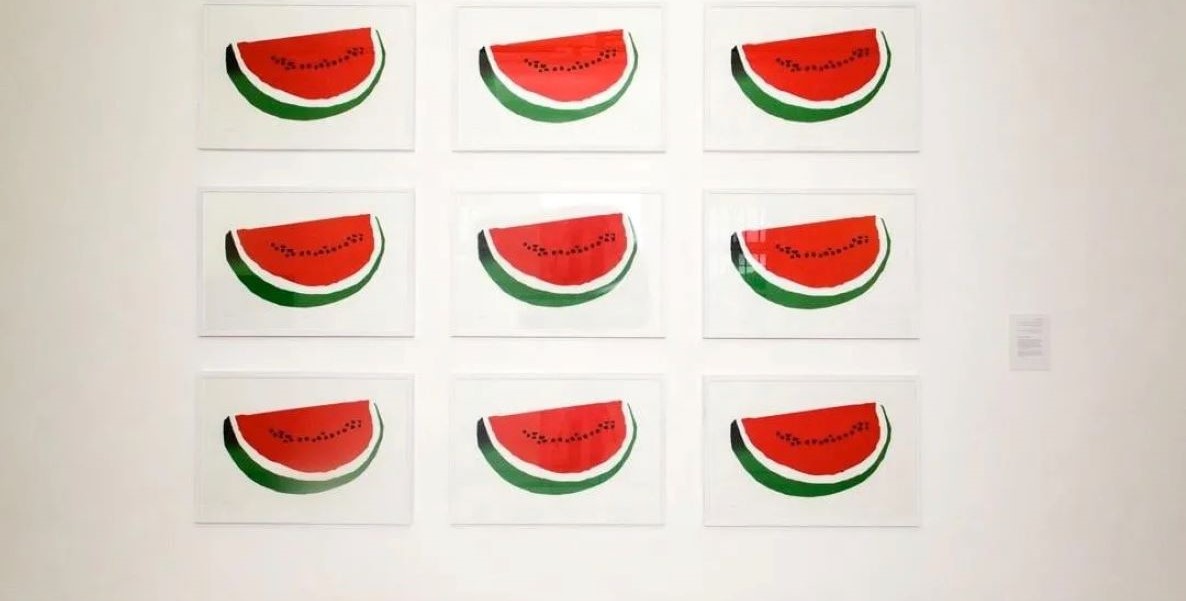A flag is a piece of fabric that countries, organizations and sometimes overly enthusiastic sports fans wave around to assert their existence and affiliations. It’s a flappable fluttering nametag, a way that individuals identify with things larger than themselves — movements, histories, resistance. Historically, flags helped medieval warriors distinguish themselves from belligerent enemies to avoid friendly stabbings on the battlefield.
Today, they are used to decorate embassies, adorn government buildings and as emojis that signal online affinities sometimes steeped in symbolism. All over our world, we have collectively agreed to imbue flags with deep meaning and sometimes patriotic fervor.
For her X avatar, real-life activist Bree Newsome has a signature image of a watermelon wedge. A caption along the curve of the watermelon rind reads “This is not a watermelon.” And it’s not. It is an image of a watermelon that symbolizes a flag — the Palestinian flag. The symbolism relies less on the fruit and more on the fruit’s colors. Citrullus lanatus is red, black, green and white, the colors of the flag chosen to represent the people of Palestine. How the watermelon became the symbol for the Palestinian flag predates the Oslo Accords. Armani Syed wrote about this for Time magazine in late October 2023. At the time, fewer than 4,000 people had been killed in Gaza in response to Hamas’ October 7 terrorist attack.

The brief history of the watermelon-as-Palestinian flag is simple in comparison to the history, region and people whose flag it symbolizes. In short, when Israel banned the Palestinian flag, Palestinians chose watermelons — and eventually images of the watermelon wedge — as symbolic stand-ins for the flag itself. Sometimes these watermelon wedge images were captioned with “This is not a Palestinian flag.”
Given the fruitful symbolism of the watermelon flag and the long history of what must be the most racialized fruit in the United States, it cannot be much of a surprise that some Black Americans find solidarity in the plight of Palestinian people. This is not a pro-Palestine think piece.
The pendulum swings
The connective symbology of watermelons and flags is not lost in the iconography of Bree Newsome, who risked life and liberty to take down the Confederate flag way back in 2015. Newsome knows the power of flags; her activism highlighted the racist residue of the treasonous Confederacy in some of our favorite Southern states. Some of that residue is still there.
These days the collective (if coerced) American sentiment that led to concessions made to remove the physical vestiges of the Confederacy (from some state capitals and even some textbooks) has long since receded. Earlier this month, the Shenandoah County school board in Virginia voted to restore the names of Confederate leaders to their schools. The pendulum swings, I guess.
Or maybe it swung with the 2016 election and the emergence of the MAGA world made manifest in what we still call the Supreme Court. Recently news broke that Justice Alito hung an American flag upside-down outside of his home in Virginia, weeks after the January 6 insurrection was organized to prevent the peaceful transfer of power from President Trump to President Biden. The transfer of power was not peaceful. And the flags waved in the process included the Confederate Battle flag/the Southern Cross/the Dixie flag, aka the rebel flag. (Yes, the flag of the Confederacy goes by many names.)
Some of the J-6 seditionists waved the American flag upside down to symbolize their treasonous “stop the steal” movement. Alito’s flag hanging was clearly in solidarity with them. Justice Alito blames his wife for what he dismisses as something akin to a wardrobe malfunction. (What is it with these Supreme Court justices and the wife-blaming?)
For what it’s worth, we should probably all start flying the American flag upside-down. Our nation is in distress.
The waving/hanging of an upside-down American flag is supposed to signal extreme distress in our nation. It’s like a watermelon flag right here in America, except that the wrong people want to lay claim to some kind of Palestinian-like oppression. The MAGA crowd claims that the evil left has stolen — not just an election, but their very (retrograde) way of life. Their disdain for their own demographic destiny in these United States requires the cloak of almost any flag other than the right-side-up Stars and Stripes. They love the “Don’t Tread on Me” flag, aka the Gadsden Flag. They will cling to the Confederate flag with their cold white dying hands. They prefer the black and blue version — The Thin Blue Line flag, which supports the police over Black Lives Matter — to the traditional Stars and Stripes. And a Supreme Court Justice hung the American flag upside-down to signal his solidarity with those who would undermine the American democratic experiment.
For many reasons, this makes sense. They have to find old flags to signal their discontent while those appointed to be the most judicious are the opposite of impartial. They are partisan. And their corruption — for Justices Alito and Thomas — is something that symbolizes what has become of the Supreme Court in the post-Obama era. This court was plundered and colonized by right-wing extremists in partnership with Sen. Mitch McConnell, former President Donald Trump, and the Heritage Foundation. We are reaping what was sown in the end of rights for too many women, the silencing of too many voters’ voices and the end of any affirmative action on behalf of too many of us that have survived the American blueprint for white supremacy and racial violence.
The Supreme Court has become a symptomatic signal of our nation’s real distress. Through the petty machinations of bad faith politicians and a disaffected voting populace, we are all now subject to something beyond the more traditional conservatism of a bygone era. This court smacks of the kind of ignorance-as-entertainment that resonates with the MAGA crowd and its most popular flag wavers — Marjorie Taylor Greene, Tommy Tuberville and others.

How else could a Supreme Court Justice think he could publicly flag-wave in solidarity with those who want to end America?
For what it’s worth, we should probably all start flying the American flag upside-down. Our nation is in distress. We are staring in the face a real possibility that Donald Trump will secure a second term. Disaffected voters are disgusted with this nation’s complicity in the death and destruction in Gaza. They are part of a growing coalition of would-be Democratic voters who might not support Biden’s re-election. There is war around the world and a regressive pendulum swinging back to our anti-Black default here at home.
For some of us, that watermelon flag feels right, minus the white rind. The red, black, and green has its own meaning for those who are descended from enslaved Africans in America. That flag, the red, black and green one, also known as the UNIA flag, the Pan-African flag, the Marcus Garvey flag, is probably best known as the Black Liberation flag.
James Peterson is a regular contributor to The Citizen and host of Evening WURDs on WURD, Philadelphia’s Black-owned talk radio station.
The Citizen welcomes guest commentary from community members who represent that it is their own work and their own opinion based on true facts that they know firsthand.
![]() MORE FROM JAMES PETERSON
MORE FROM JAMES PETERSON



